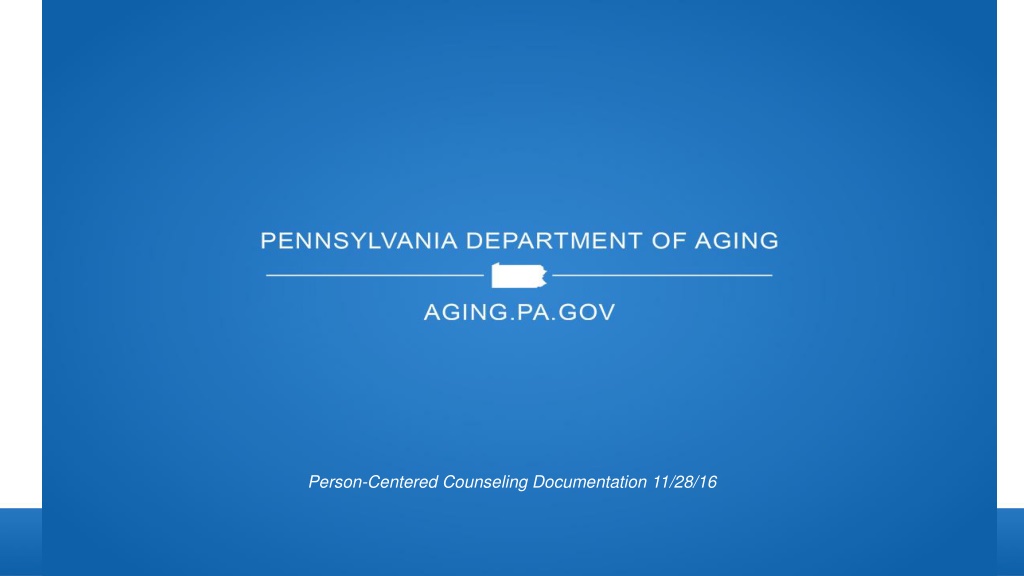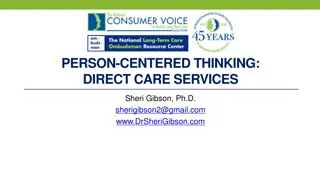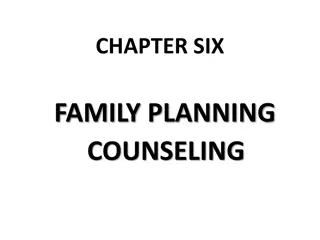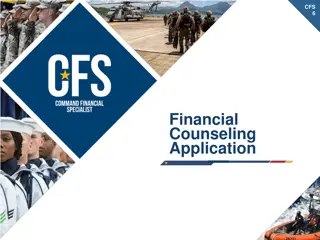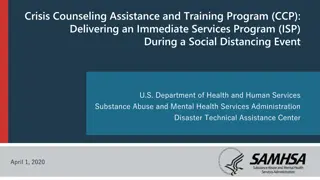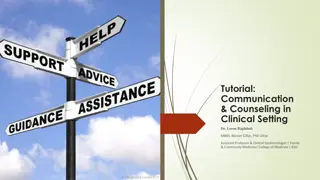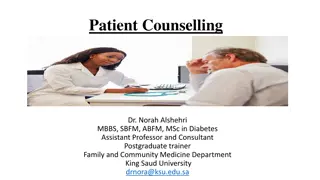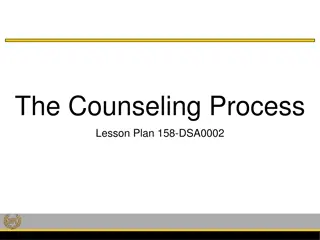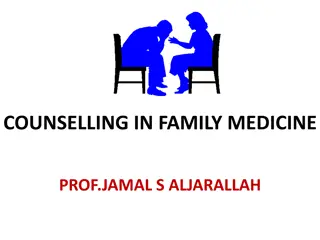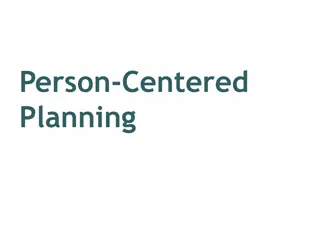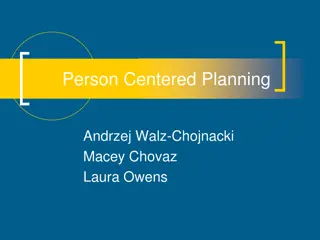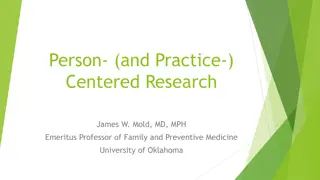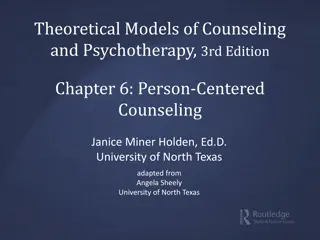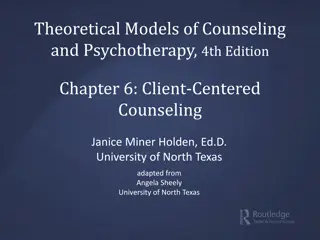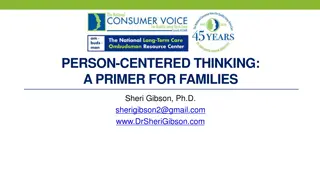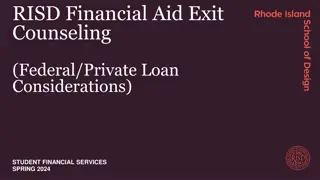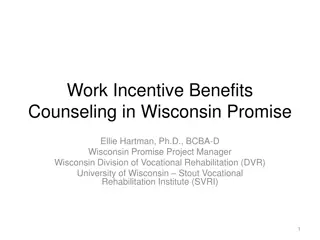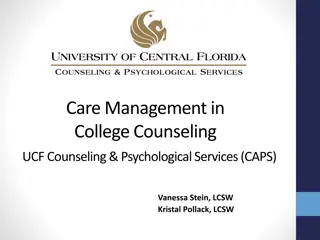Person-Centered Counseling
Person-Centered Counseling focuses on individuals' strengths, preferences, and goals to help navigate through available support services. Launched in 2012, this approach serves people with disabilities and older adults, bridging gaps in services and offering personalized assistance. Through a continuum of support, it aids individuals in accessing resources and planning for their long-term needs.
Download Presentation

Please find below an Image/Link to download the presentation.
The content on the website is provided AS IS for your information and personal use only. It may not be sold, licensed, or shared on other websites without obtaining consent from the author.If you encounter any issues during the download, it is possible that the publisher has removed the file from their server.
You are allowed to download the files provided on this website for personal or commercial use, subject to the condition that they are used lawfully. All files are the property of their respective owners.
The content on the website is provided AS IS for your information and personal use only. It may not be sold, licensed, or shared on other websites without obtaining consent from the author.
E N D
Presentation Transcript
Person-Centered Counseling
Person-Centered Approach Overview The approach came out of the Disabilities Rights Movement. It focuses on the individual. It highlights strengths, capacities, preferences, and desired goals of individuals. Each person determines what is necessary and desirable to create a meaningful life. 3
Person- Centered Counseling Launched statewide in 2012. Provided by over 100 individuals across the state, mostly employed by AAAs, Centers for Independent Living (CILs), and other established Supports Coordination agencies. One of the criteria of a fully functional Aging and Disability Resource program.
Person- Centered Counseling Focuses on: Personal interview Overview of Resources Supporting the decision-support process Development of an Action Plan Follow up Designed to help consumers navigate the vast array of LTSS options available Based on their needs/preferences/values/strengths and focuses on their prioritized goals
Person- Centered Counseling Serves people with disabilities and older adults There is no income requirement. Must have at least 2 LTSS needs and want to participate. Is a service between I & R and Case Management/ Supports Coordination. Fills a gap for those who may be on waiting lists, are not be eligible for or have been denied services, do not know where to start, have experienced a life-changing event, want to plan ahead, etc.
Person- Centered Counseling Can assist with individuals who need help navigating through waiver enrollment. Connects people to public and private resources while they wait to get connected to more long-term supports. Referrals typically go to a PCCer directly, through someone in their organization, or through the Pa Link Call Center.
What Is Person-Centered Counseling? Person-Centered Counseling on a Continuum of Support Support/Service Coordination Care Management Person- Centered Counseling Information & Referral Information & Assistance 8
What Defines the Need? Has two or more LTSS needs Doesn t know what services are available Was denied for Medicaid-funded program or other publically- funded program Individuals in transition From hospitals From Nursing Homes From other areas Aging Out
What Defines the Need? Had a recent life-changing event Change or loss of caregiver Change in finances Had a recent change in health Has cognitive limitations
Potential LTSS Needs Housing Substance Abuse Support Peer Support Legal Resources Application Assistance Transportation LIHEAP SNAP PACE
Deciding Who is Appropriate for Person-Centered Counseling Is the indiv in need calling? Has the indiv in need been asked about their preferences and it is documented? Yes No Does the indiv have two or more LTSS needs? Yes No This is not Person- Centered Counseling Yes No Continue to the next page
Deciding Who is Appropriate for Person-Centered Counseling Does the person already know what they need and how to access it? Continue with the Personal Interview Yes No Review all resources available This is not Person- Centered Counseling Create Action Plan Continue to next page
Deciding Who is Appropriate for Person-Centered Counseling? Was there Follow- Up? This is not Person- Centered Counseling Yes No Were there at least 3 attempts made to contact the indiv? This is Person- Centered Counseling Has the indiv refused follow-up and it is documented? Yes No Yes No
How Does Person-Centered Counseling Compliment Waiver Services? An individual can receive Person-Centered Counseling while they are waiting to receive Waiver Services. Waiver Services can meet one of the two LTSS needs. Once an individual is in a waiver, resource connecting should transition to the Supports Coordinator/Case Manager.
PCC and Waiver Enrollment PCC and waiver enrollment If someone needs assistance navigating through the waiver process, that can be a session of PCC. We also want to look for ways to assist in other areas (SNAP, transportation, support groups, etc.) There is no expectation that PCCers find free personal assistance services for those who are waiting for enrollment. Individuals who are navigating through waiver enrollment should have PCC open until they are enrolled.
PCC and Additional Supports If someone has a care manager or supports coordinator, we want to direct them to that person to assist. If they still require assistance, we can still help them with PCC if the CM/SC is not in the same organization, unless we are helping them to transition from OPTIONS or ACT 150. If that is the case, then the PCCer and the CM cannot be the same person.
Potential PCC Flow I & R/A PCC LOCA
Potential PCC Flow I & R/A PCC APPRISE
Potential PCC Flow Multiple Needs I & R/A PCC
Potential PCC Flow Pa Link Call Center IEB PCC
Potential PCC Flow OPTIONS Program Change in Need PCC
Potential PCC Flow Multiple Needs APPRISE PCC
How is Training Requested? Currently, an organization will ask the Lead Coordinator in their Service area to request the training. In the future, an application will be submitted. It will follow the same flow. Regional Coordinator Project Manager Lead
How is Training Requested? Trainings are requested by the PM, to PDA admin via a formal proposal process. Trainings are scheduled by the PM according to when the request was made, and the location of the organization making the request in relation to other organizations that have also made the request.
PCC Statistics From December 1, 2016 until November 31, 2017: - There were 1192 sessions of PCC - 77% of those served are over 60 - 26% of the those served have been assisted with PA 600s and/or physician s scripts.
PCC Statistics Since December 20, 2017 until November 31, 2017: - 793 have called the Pa Link Call Center through information given by the IEB - 61% of those individuals are over 60 - Almost 45% of these older adults are from the urban areas (30% Philadelphia, 13% Allegheny)
PCC Statistics Other than waiver assistance, Person-Centered Counselors primarily assisted with: Help with Financial Assistance Housing Healthcare Advocacy Food Transportation
Questions? Faith Haeussler Project Manager Aging and Disability Resource Office Department of Aging C-fhaeussl@pa.gov
